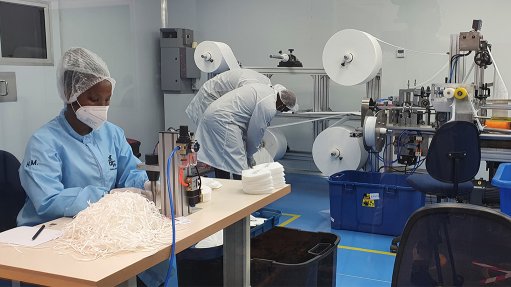
BT Industrial's cleanroom medical device manufacturing facility
Photo by: Creamer Media's Marleny Arnoldi
High-density polyethylene (HDPE) pipes manufacturer BT Industrial Group has extended its plastics-processing capacity to include polymer-based medical fabrics and components.
MD Kgomotso Lekola says the company’s electrostatic melt-blown fabric is currently being used to produce FFP2 medical-grade masks, which caters to Covid-19 demand and the standard demand that hospitals have for high-quality locally-made masks.
With BT Industrial having built an International Organisation for Standardisation (ISO) Class 7 cleanroom manufacturing facility, as well as fully equipped quality testing and research laboratories, the company aims to venture into more niche areas of medical device manufacturing in due course.
Lekola explains that its world-class face masks feature a proprietary five-layer fabric design and have been found to be on par, if not better, than what global competitors offer in terms of filtration efficiency and low breathing resistance.
A team of 11 engineers is responsible for keeping a close eye on quality in support of BT Industrial’s ISO 9001 and ISO 4427 accreditations.
The company is in the process of getting its Conformitè Europëenne mark, which is the European Union’s mandatory conformity marking for regulating goods sold within the European Economic Area.
Lekola confirms that the company can manufacture up to 1.7-million respiratory face masks a month, with each batch of masks accompanied by a certificate of conformance.
BT Industrial business development director Kgomotso Maphai tells Engineering News that the company’s raw materials, used for both pipes and medical device manufacturing, are sourced locally.
Meanwhile, on the pipes manufacturing side, the company can process 1 500 t of HDPE resin a month. Since the company’s first pipe extrusion in February 2019, it has produced more than 9 000 km of pipe, mainly for export to mining operations in Africa.
Lekola notes that the demand for core water infrastructure owing to the Covid-19 pandemic has meant that about 80% of the company’s orders for the first half of this year were destined for cross-border projects.
Black-owned and black-managed BT Industrial has, since its establishment in 2017, grown to employ more than 100 people and operate two distinct manufacturing capabilities at its 4 000 m2 site in Germiston.
Lekola avers that his rationale for venturing into pipes manufacturing is because they are drivers of development and industrialisation. To scale up industrialisation, one needs pipes to convey commodities that people use in their daily lives – even in people’s modern life, considering ducting that is used for optical fibre.
“The move from HDPE pipes to medical devices is part and parcel of a carefully orchestrated diversification strategy. The three main pillars of our solutions are for heavy industry, such as pipes and engineering services, to solutions and scientific services for the medical industry.
“These are held together by our science, engineering and research and development capability, since it allows us to maintain a certain core competency around the processing of materials,” states Lekola.